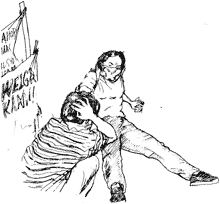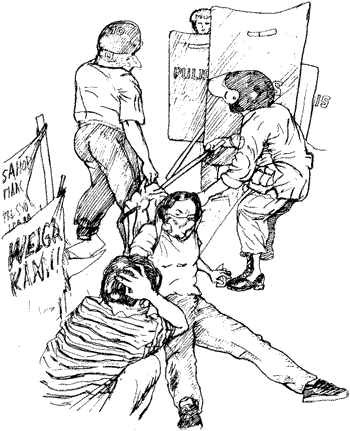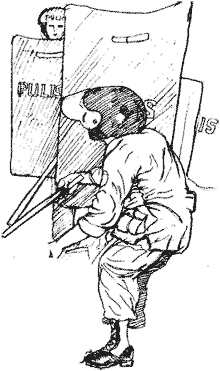Resist the AJ, onward with the strike
When the workers of REN Transport Corporation went on strike in July, the Department of Labor and Employment (DOLE) immediately issued an "assumption of jurisdiction" or AJ Order. Through the AJ Order, the DOLE effectively stopped the strike and forced all the striking workers back to work. According to reactionary law, the DOLE could assume jurisdiction over a strike only if the latter poses a danger to the "national interest." REN Transport is a company that collects garbage in Metro Manila. DOLE could not explain how a few days of not collecting garbage could endanger national interest.
The AJ order is one of the most common and arbitrary tactics used by the reactionary state against workers. It is a potent weapon wielded by the regime to fight and crush militant unionism in the country. With the number of AJ orders she has imposed and the speed with which they are processed, it is not surprising that DOLE secretary Patricia Sto. Tomas has been dubbed the "AJ Queen."
Despite the fact that over 382 unions filed notices of strike (NOS) from January to July this year, only 15 have actually been able to set up picket lines. Twenty-three out of the 382 unions were subject to AJ orders even before picket lines could be set up. Fifteen were subject to compulsory arbitration. Of those that actually went on strike, two were subject to AJ orders. Meanwhile, up to 386 impending strikes were automatically subject to preventive mediation. In these cases, the workers did not even get to file notices of strike. The DOLE boasts that the number of actual strikes and lockouts has gone down compared to previous years. Their statistics hide the overwhelming number of strikes that do not push through because they are subject to AJ orders or preventive mediation during the early stages.
The AJ order is almost always imposed on strikes against big foreign or local companies and even small corporations that happen to be owned by politicians or their associates. This August, strikes at Hacienda Luisita Incorporated and Sulpicio Lines were subjected to AJ orders. Prior to this, workers' strikes at the Philippine Rabbit Bus Lines, Central Azucarera de Tarlac (CAT), Lepanto Mining Corporation, Toyota Motors Corporation and others were likewise subjected to AJ. This was also the case a year ago with the strikes at Tritran Bus Lines, SM, La Tonde�a, San Miguel Corporation and Nestl�.
 The regime has a long and bloody record of breaking up strikes to enforce AJ orders. These technicalities cover up the widespread violation of workers' human and union rights. The Sulpicio Lines strike last month provides a glaring example. Elements of the AFP breached the Sulpicio workers' picket line commando style and shot at the workers to break up their strike. Fearing for their lives, the workers and their supporters were forced to abandon the picket line, and eventually, their struggle. The regime has a long and bloody record of breaking up strikes to enforce AJ orders. These technicalities cover up the widespread violation of workers' human and union rights. The Sulpicio Lines strike last month provides a glaring example. Elements of the AFP breached the Sulpicio workers' picket line commando style and shot at the workers to break up their strike. Fearing for their lives, the workers and their supporters were forced to abandon the picket line, and eventually, their struggle.
So many unions have been busted because of the AJ tactic. A DOLE order in 2003 stipulates that union leaders and workers who continue to assert their right to strike should be terminated. In almost all of the cases mentioned above, union leaders and the strikes' most ardent supporters were automatically laid off.
There has yet to be a significant case where workers succeeded in having an AJ order reversed by questioning its legality. The very process is fraught with inutility because the cases have to be filed with the DOLE. Not surprisingly, the law rarely takes the workers' side. Even in cases where the workers do win, the law is powerless to enforce any judgment against the capitalists.
Defend the right to strike
In the face of blatantly pro-capitalist laws, workers are faced with the tremendous challenge of defending their right to strike. It is particularly important to oppose the use of the AJ tactic against the workers. Waging resistance against the AJ tactic will strengthen the entire workers' movement.
In many instances, workers confront the AJ tactic by continuing the strike. Actually, workers have no other choice�for them to allow their strike to be subjected to an AJ order and to follow the DOLE's commands is tantamount to surrendering their struggle.

In advanced experiences, workers have been able to persevere and assert their right to pursue negotiations between their union and management despite the imposition of an AJ order. Among the successful experiences are the strikes at the Philippine Rabbit Bus Lines, Lepanto Mining Corporation and the Central Azucarera de Tarlac in 2003 and early this year. In these cases, workers courageously defied the AJ and the returnto- work orders issued by the DOLE.
United front. The workers confronted threats to break up their picket line by expanding and reinforcing their ranks. The political and even the physical and material support of their families and various sectors of their community were major factors in their ability to continue their struggle. In the CAT strike, up to 5,000 people showed up at the picket line even if the company had only 1,000 workers. In the Lepanto strike, entire communities helped to defend and support the strike.
In the end, the military, police and hired goons found it difficult to break up picket lines that were reinforced by hundreds, if not thousands, of people.
Mediation by other forces. In a number of cases, workers refused to recognize mediation by the pro-capitalist DOLE. As a result, local government officials and other personalities who could be depended on to fairly weigh the interests of both sides served as mediators. In the case of Lepanto, it was the local mayor himself and representatives of the Bayan Muna party who acted as mediators in negotiations between the workers and management. In another case, the local government passed a resolution supporting the striking workers and calling for a speedy and decisive resolution to the strike. Local government officials also play a helpful role in restraining violence against the picket line.
 Propaganda battle. Along with strengthening the picket line, it is important to continually propagate the workers' issues and expose the violations and hardships wrought by the capitalists. In the past, bringing the issues to radio, newspapers and television has helped immensely. More people were made aware of workers' conditions and the DOLE's pro-capitalist character through the media, generating sufficient interest and sympathy that forced the DOLE to a partial retreat and the capitalists to address the workers' demands. Propaganda battle. Along with strengthening the picket line, it is important to continually propagate the workers' issues and expose the violations and hardships wrought by the capitalists. In the past, bringing the issues to radio, newspapers and television has helped immensely. More people were made aware of workers' conditions and the DOLE's pro-capitalist character through the media, generating sufficient interest and sympathy that forced the DOLE to a partial retreat and the capitalists to address the workers' demands.
All of these measures enable the workers to thwart the violence perpetrated by the regime. Above all, the key to a victorious strike is the union's resoluteness and preparedness to push through with it despite the threats posed by antiworker laws and the reactionary state's minions.

| 
